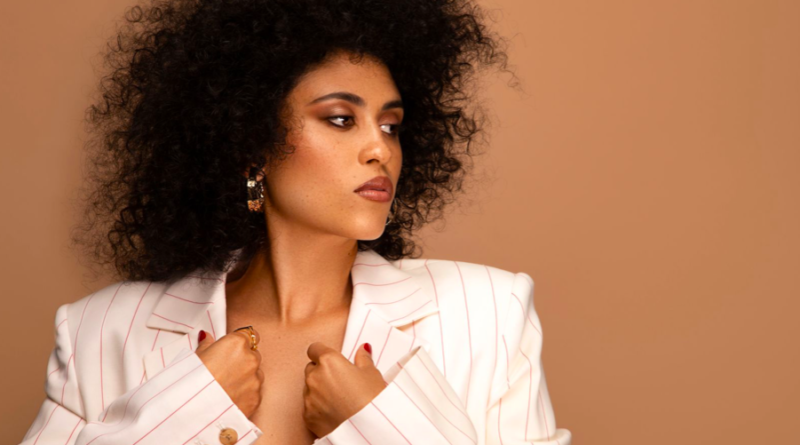INTERVIEW: Alea’s City Winery concert will feature songs from her new album, ‘Alborotá’
Photo: Alea’s new album is called Alborotá. Photo courtesy of artist / Provided by Press Junkie PR with permission.
Alea, the accomplisher singer-songwriter, has been impacted by the pandemic, much like other musicians around the world, but her artistry never stopped. The Colombia-born and Bronx-based performer stayed busy during the past 18 months putting the final touches on her new album, Alborotá, which was recently released. She’ll celebrate these new songs at a special concert Friday, Aug. 27 at The Loft at City Winery in New York City.
“It feels really good to get to this point,” Alea said during a recent phone interview. “I think my idea around the album started around 2017. I had just moved to New York, and New York was brutal. I was working four jobs, doing so many different things. I couldn’t find much inspiration. How was I going to make it here? I started writing about the things that were making me really uncomfortable — at work, with other people, and things I didn’t feel I was speaking aloud about or that I was holding in. I started writing the songs.”
Those songs started to spill out, and they feature touches of cumbia, porro, currulao and huapango, with pop, Afro and savory Latin grooves thrown in for good measure, according to a press release. Over the past two years, listeners have had the chance to listen to a few of the singles off the new record, and one of the instant fan favorites is “Échale Sal,” named one of NPR Alt.Latino’s favorite tunes of 2020.
“Understanding a little bit of [my] culture helped me get a little bit more connected to my own spiritual release and to trying to heal all those silences that I felt weren’t only mine,” Alea said about the inspiration for Alborotá. “They came from my grandmother and my mother and the women before me, and every woman that I started having conversations with in that time were telling me stories that they had gone through. I’m kind of that kind of person that people tell things. It’s crazy the amount of stories I was hearing and that I was putting inside me. I said I need to put this into songs, so I started writing.”
These inspirations and stories eventually gathered steam, and then, in 2018, Alea lost her voice. She suffered from a vocal cord injury, and the silence put her new project into perspective. “I called a friend who has always been there to help me with conceptualizing, and we started putting thoughts to paper,” she said.
She eventually recovered from the injury, and the songs that emerged were deeply personal. For example, the title track is an anthem for womxn, and while writing the tune, Alea kept telling herself that she wasn’t “being too much” for the world or “needed to tone it down,” as she sometimes heard in her life. She was done with compromises and letting other people tell her how to live.
“So I started being comfortable with the idea of making others uncomfortable because as a Latin woman that’s not something you do,” the singer said. “There’s this pride in sacrifice, and culturally we really take it to another level.”
“Aire Gaujiro,” another song on the album, is a tribute to La Guajira, Alea’s “forgotten state” in Colombia that loves its unique form of country and folk music called Vallenato. And as the inspiration came, Alea turned toward her fan base and asked them for some help to make this dream a reality. She launched an Indiegogo campaign because she had a mass of ideas but needed some funding for the recording process.
“How was I going to make [the album], working four jobs, babysitting, doing all kinds of teaching music, voice, cafeteria, anything,” she said. “This Indiegogo ended up being successful. There were about 188 backers. Everybody was just so sort of supportive of how we were thinking of this. We only had a few songs back then. We only had three or four songs fully written. The rest were ideas that we had, scratch stuff, a little chorus there, verse over there. The rest of the album came by performing.”
After the funding came through, Alea connected with producer Sinuhé Padilla Isunza at Jarana Records. During the recording process, she appreciated his vast knowledge of Latin America folkloric music. “This man has traveled all over the world, especially in Latin America, actually living with these communities where this music was born,” she said. “He helped me land those rhythms and this new aesthetic of music that I had somehow in my head, but I couldn’t see it fully in front of me. We got together, and he said, ‘Yeah, I want to do this album. Let me produce it.’ Definitely I was very excited that somebody would even consider doing something so blind because it’s not straightforward. I wasn’t doing a pop album, or, oh yeah, I wanted to sound like this artist. When people ask me what do you sound like, I can’t really say.”
As Alea put it, she was making something out of nothing.
“Little by little people would find it and maybe like it,” the singer hoped. “I had to go through with it. It’s a very deep impulse and strength to keep at it after all these years.”
By John Soltes / Publisher / John@HollywoodSoapbox.com
Alea’s new album is Alborotá, and she will perform Friday, Aug. 27 at The Loft at City Winery in New York City. Click here for more information and tickets.

